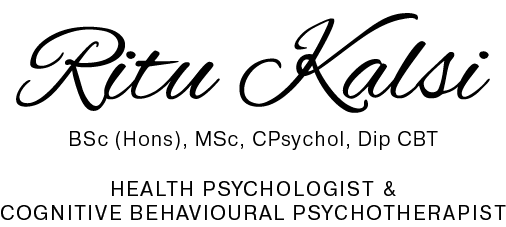During tough times, the right therapeutic guidance can inspire you with hope, providing you with the strategies needed to face and overcome your challenges. Life's unforeseen changes can trigger a range of emotional difficulties, including anxiety, depression, and difficulties with adjustment. I offer therapy services for adults seeking to improve their mental health with the expertise of an experienced and qualified Psychologist and Cognitive Behavioural Psychotherapist.
I recognise the complexity of human experiences and am dedicated to providing you with the essential tools to approach both emotional and physical challenges in a constructive manner. My main emphasis lies in imparting techniques for emotional regulation, empowering you to navigate adversity with dignity and resilience.
Accessibility to timely and appropriate support is crucial. That is why I offer remote therapy sessions. This can provide you with the flexibility needed and stability required for regular commitment to the process of therapy. With this approach, therapy becomes a consistent part of your life, empowering you to engage fully in the process, achieve your personal objectives, and enhance your overall well-being.
Therapy can help you
In therapy, change is the cornerstone of progress and growth. It’s about embarking on a journey of transformation, where you are able to confront challenges, explore emotions, and develop new perspectives. Through introspection and guidance, therapy can empower you to break free from old patterns, cultivate resilience, and embrace positive change. Whether it's overcoming obstacles, improving relationships, or enhancing overall well-being, therapy will offer a safe space for change to take place in order for you to flourish.
You could be facing a health threat, or dealing with an unexpected change of circumstances. By unravelling the origins of your ingrained thinking styles, you can harness specialised skills to create meaningful changes and make choices aligned with your values. With practise, these changes will have the potential to endure, providing you with emotional flexibility in the face of setbacks, and allowing you to live your best life.
Commitment to change
-
Anxiety is a mental health condition characterised by excessive worry, fear, or nervousness. It can manifest as physical symptoms, affect daily functioning, and can lead to avoidance behaviours. While occasional anxiety is normal, persistent and overwhelming anxiety may require therapeutic interventions, lifestyle changes, and, in some cases, medication for effective management. To understand more about how psychological therapy can help, please visit the ‘Specialisms & Conditions Treated’ page.
-
Medical conditions can affect the way we cope with the ongoing demands it places on you physically and emotionally. Understanding the mind-body link is essential for comprehensive health care, as mental well-being can significantly impact physical health outcomes. By addressing both aspects holistically, you can achieve greater overall well-being and resilience in coping with medical conditions. To understand more about how psychological therapy can help, please visit the ‘Specialisms & Conditions Treated’ page.
-
ADHD is a neurodevelopmental disorder marked by persistent inattention, impulsivity, and hyperactivity. It impacts daily functioning, often starting in childhood and persisting into adulthood. While its exact cause is complex, management includes behavioural therapy and medication, helping individuals cope with challenges in focus, organisation, and impulse control. To understand more about how psychological therapy can help, please visit the ‘Specialisms & Conditions Treated’ page.
-
Any addiction is a compulsive reliance on substances or behaviours that can cause disruptions to daily life. It involves a loss of control, cravings, and can cause harmful consequences to you or your loved ones. Whatever the reliance is on, whether habitual or social, breaking free often requires support, therapy, and lifestyle changes to overcome the powerful grip it can have on your well-being. To understand more about how psychological therapy can help, please visit the ‘Specialisms & Conditions Treated’ page.
-
Depression is a mental health condition that is marked by persistent feelings of sadness, hopelessness, and a lack of interest in daily activities. It can affect sleep, appetite, and energy levels, impacting overall well-being. Treatment often involves therapy, support, and, in some cases, medication to alleviate symptoms and promote mental health recovery. To understand more about how psychological therapy can help, please visit the ‘Specialisms & Conditions Treated’ page.
-
Unhealthy relational patterns refer to challenges or conflicts arising between individuals in personal, familial, or romantic connections. Common problems include communication breakdowns, trust issues, or differences in values. Resolving these challenges often involves open communication, empathy, and compromise. To understand more about how psychological therapy can help, please visit the ‘Specialisms & Conditions Treated’ page.
-
Perfectionism is not a disorder but can cause many emotional and functional difficulties in your life. It can be addressed through psychological therapy by challenging negatively biased beliefs and behaviours, fostering self-compassion, and promoting healthier coping strategies. To understand more about how psychological therapy can help, please visit the ‘Specialisms & Conditions Treated’ page.
-
Trauma refers to emotional or psychological distress resulting from distressing events, often exceeding a person's ability to cope. It can stem from various experiences such as accidents, abuse, or natural disasters, impacting mental and emotional well-being. Coping mechanisms, therapy, and support can all play a vital role in healing from trauma and rebuilding resilience. To understand more about how psychological therapy can help, please visit the ‘Specialisms & Conditions Treated’ page.
“To change one’s life: 1. Start immediately. 2. Do it flamboyantly. 3. No exceptions.”
-William James


